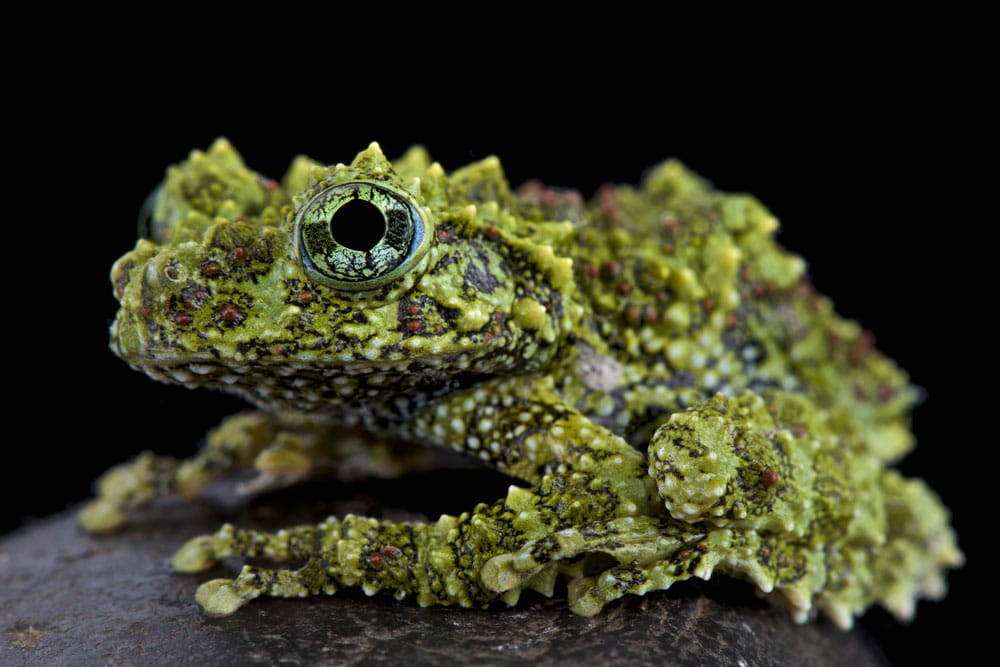Theloderma corticale are easy to keep, trouble free, and make great display animals.
Natural Habitat
Vietnamese mossy frogs are found at an elevation of about 3,000 feet in flooded caves and on the banks of mountain streams. They are nocturnal and semi-aquatic, spending much of their time hiding in the water under rocks and floating plants.
Captive Housing
A 10-gallon terrarium is great for two adults. Add 5 gallons for each additional frog. Put about 3 inches of filtered water into the tank. You can use gravel or river stones for the bottom, but it’s a lot easier to clean if you don’t. The frogs don’t seem to require substrate. Provide some hiding places in the tank, made of faux rock or ceramic, or even some small pieces of Mopani wood. Use something that pokes out of the water just a bit, but also has an underwater area for them to hide in. They will use this to perch out of the water, so make sure it is big enough to accommodate the entire frog. Clay flower pots can also be used to provide such hiding places/perches.
Put a quality submersible filter in the tank, which will keep the water clean and add a little current to it. Cork background on the inside back of the tank will add a nice look to the enclosure and give the frogs something to climb on. A few Mopani wood branches coming out of the water, and some attractive artificial vines or other leafy items for shelter and security when they are out of the water completes the setup. Mossy frogs are nocturnal and live in fairly cool realms, so no special lighting or heating is required. A temperature range in the mid-70-degrees Fahrenheit works great. Anywhere between 65 to 80 degrees is tolerable.

The color and texture of their skin looks like a clump of moss. The green skin, having black spots and stains, is peppered with many tubercles and spines. Therefore, it can be quite impossible to see a calmly sitting frog.
Diet
This carnivore feeds on small crickets. Dust the crickets with a low- D3 calcium supplement at each feeding. Feed them about three times a week, as many crickets as they will take in one sitting.
What’s Available
For years, mossy frogs were imported and expensive. The first ones I ever saw sold for more than $300 each. We’ve come a long way, and the prices have steadily declined. Most mossy frogs offered for sale now are captive-bred, well-established specimens, and they are a fraction of what they used to cost. Find them at reptile specialty stores, on the Internet and sometimes at reptile shows.
Verdict
Mossy frogs are shy and should not be handled unless necessary. They are easy to keep, trouble-free and make great display animals if you can spot them in plain view. They are masters of camouflage, which makes them pretty neat. Great for both beginners and advanced hobbyists.
Ken Foose produced his first captive-bred snakes at age 11. With a Master’s Degree in Zoology, he has been both zookeeper and curator. He opened Exotic Pets, which specializes in reptiles and amphibians, in Las Vegas in 1991, and he is currently vice president of the International Herpetological Symposium.


